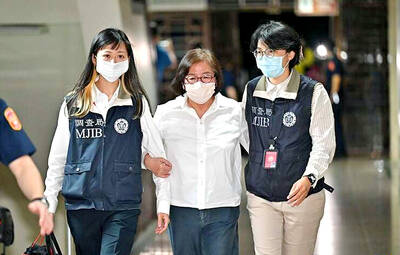The Ministry of Education’s (MOE) recent reinstatement of calligraphy to curriculum guidelines and decision to allocate NT$4 million (US$128,000) to set up calligraphy centers in 24 elementary and middle schools across the nation has produced mixed reactions from legislators and educators.
Academics said calligraphy education has been seen as less important since the implementation in 2004 of the Nine-Year Educational Program — which allowed schools partial autonomy in establishing curricula — adding that the then-Democratic Progressive Party (DPP) administration underestimated the importance of calligraphy and its place within Chinese culture.
However, calligraphy education was viewed with greater significance when President Ma Ying-jeou (馬英九) of the Chinese Nationalist Party (KMT) came to power in 2008, they said.
In 2011, the ministry published curriculum guidelines for calligraphy, and later included the standard of calligraphy education in criteria used to evaluate a school’s performance and eligibility for ministry subsidization, they said.
The level of calligraphy education in the nation has received increasing attention ever since — with calligrapher Tong Yang-tze’s (董陽孜) saying last year that Taiwan’s calligraphy education standards had fallen behind those in China, and Ma donating NT$1 million to an elementary school in Taichung for the construction of a classroom dedicated to calligraphy education.
Minister of Education Wu Se-hwa (吳思華) said that the 12-year education curriculum highlights pluralism, and that calligraphy is a form of art worthy of conservation, which can help students learn how to concentrate and relax.
K-12 Education Administration division head Hsu Li-chuan (許麗娟) said the ministry recently formulated a set of regulations on subsidizing calligraphy education, with a NT$4 million budget available for teaching staff, learning activities and schools specializing in calligraphy education.
The ministry designated 24 schools as calligraphy schools, which would be provided with relevant teaching materials and specialized curricula, she said.
Calligraphy education is the only subject that has received special funding from the ministry, and many schools nationwide have been subsidized, except those in Taoyuan and Hsinchu counties and Tainan, she added.
DPP Legislator Cheng Li-chun (鄭麗君) said the unique art of Oriental calligraphy should be preserved, but it should be the responsibility of the Ministry of Culture and not the Ministry of Education.
It is unnerving that the education ministry not only formulated curriculum guidelines on calligraphy, but also earmarked a specialized fund simply to cater to Ma’s personal penchant for calligraphy, she said, adding that the ministry should be tasked with allocating educational resources reasonably instead of varying education policies to please those in power.
“The Ma administration should avoid using calligraphy as a way to connect with China,” DPP Legislator Chen Ting-fei (陳亭妃) said.
National Alliance of Parents Organizations chairman Wu Fu-pin (吳福濱) said that as Taiwan uses traditional Chinese characters, the education ministry should put more focus on traditional Taiwanese arts, such as glove puppetry and shadow play.

Costa Rica sent a group of intelligence officials to Taiwan for a short-term training program, the first time the Central American country has done so since the countries ended official diplomatic relations in 2007, a Costa Rican media outlet reported last week. Five officials from the Costa Rican Directorate of Intelligence and Security last month spent 23 days in Taipei undergoing a series of training sessions focused on national security, La Nacion reported on Friday, quoting unnamed sources. The Costa Rican government has not confirmed the report. The Chinese embassy in Costa Rica protested the news, saying in a statement issued the same

Taiwan is to extend its visa-waiver program for Philippine passport holders for another year, starting on Aug. 1, Minister of Foreign Affairs Lin Chia-lung (林佳龍) said on Friday. Lin made the announcement during a reception in Taipei marking the 127th anniversary of Philippine independence and the 50th anniversary of the establishment of the Manila Economic and Cultural Office (MECO) in Taiwan, the Ministry of Foreign Affairs said. The decision reflected Taiwan’s commitment to deepening exchanges with the Philippines, the statement cited Lin as saying, adding that it was a key partner under the New Southbound Policy launched in 2016. Lin also expressed hope

Temperatures in New Taipei City’s Sindian District (新店) climbed past 37°C yesterday, as the Central Weather Administration (CWA) issued heat alerts for 16 municipalities, warning the public of intense heat expected across Taiwan. The hottest location in Taiwan was in Sindian, where the mercury reached 37.5°C at about 2pm, according to CWA data. Taipei’s Shilin District (士林) recorded a temperature of 37.4°C at noon, Taitung County’s Jinfeng Township (金峰) at 12:50 pm logged a temperature of 37.4°C and Miaoli County’s Toufen Township (頭份) reached 36.7°C at 11:40am, the CWA said. The weather agency yesterday issued a yellow level information notice for Taipei, New

CASE: Prosecutors have requested heavy sentences, citing a lack of remorse and the defendants’ role in ‘undermining the country’s democratic foundations’ Five people affiliated with the Chinese Nationalist Party (KMT), including senior staff from the party’s Taipei branch, were indicted yesterday for allegedly forging thousands of signatures to recall two Democratic Progressive Party (DPP) lawmakers. Those indicted include KMT Taipei chapter director Huang Lu Chin-ru (黃呂錦茹), secretary-general Chu Wen-ching (初文卿) and secretary Yao Fu-wen (姚富文), the Taipei District Prosecutors’ Office said in a news release. Prosecutors said the three were responsible for fabricating 5,211 signature forms — 2,537 related to the recall of DPP Legislator Wu Pei-yi (吳沛憶) and 2,674 for DPP Legislator Rosalia Wu (吳思瑤) — with forged entries accounting for